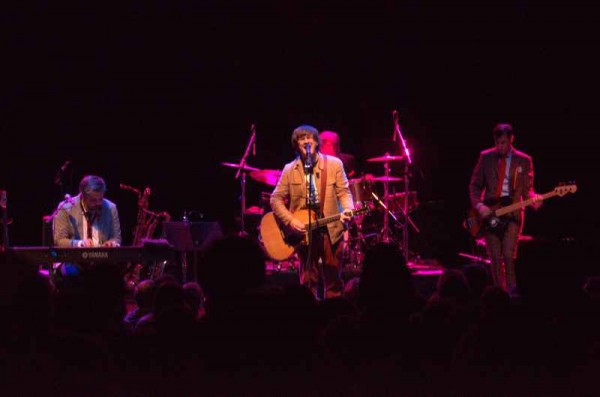 Portland punk rock trio The Thermals never disappoint live in Chicago, whether it be in a sweat-soaked Subterranean in July 2007, at Pitchfork Music Festival in 2009 (who can forget the band’s incendiary and sincere cover of Green Day’s “Basket Case?”) or just recently at Lincoln Hall. As bassist Kathy Foster pogoed throughout, drummer Westin Glass dove from the stage, while lead singer and guitarist Hutch Harris broke multiple guitar strings, sweated profusely through his camouflage t-shirt and went on multiple forays into the crowd. Touring behind their sixth record Desperate Ground, The Thermals pummeled the crowd into submission and headed to Michigan the next day to lay waste to the Wolverine State as well.
Portland punk rock trio The Thermals never disappoint live in Chicago, whether it be in a sweat-soaked Subterranean in July 2007, at Pitchfork Music Festival in 2009 (who can forget the band’s incendiary and sincere cover of Green Day’s “Basket Case?”) or just recently at Lincoln Hall. As bassist Kathy Foster pogoed throughout, drummer Westin Glass dove from the stage, while lead singer and guitarist Hutch Harris broke multiple guitar strings, sweated profusely through his camouflage t-shirt and went on multiple forays into the crowd. Touring behind their sixth record Desperate Ground, The Thermals pummeled the crowd into submission and headed to Michigan the next day to lay waste to the Wolverine State as well.
Hutch Harris is just as earnest in person as he is on The Thermals records, but when you talk to him, he doesn’t seem nearly as angry as his strident tenor delivery in concert would lead one to believe. Reached via phone the night after such a frenetic gig, it’s unclear whether he’s still recovering from the night before or saving up his energy for that evening’s show at The Loving Touch in Ferndale, Mich.
He describes the trio’s previous album, Personal Life (Kill Rock Stars) as a detour – quieter, slower, more introspective.
“Desperate Ground gets back to what we do best, loud and fast and kind of out of control” Harris says.
Not only does the record differ in terms of tempo and volume, but the band’s 2010 record, as the title suggests, “was about love and relationships, and the dark side of loving someone, the pain in love.” Desperate Ground is “about murder, violence and killing,” according to Harris.
What inspired The Thermals to record an album about killing?
“Humans are incredibly violent, humans are always at war, humans are always killing each other,” Harris says. “If you look at the subjects that we’ve done in the past: politics, religion, death and love, to us this is just another classic theme of art. There’s a lot to say about it. It’s something that’s always going on in the world.”
Harris agrees that the lyrics in the new release leave a lot of room for interpretation.
“You can take this record as an anti-war record, you can even take it as a pro-war record, but really we didn’t intend it either way. It’s not that it’s purposely ambiguous, it’s like an action film; there’s not necessarily a moral to the story. It’s pulpy and slightly irresponsible. We didn’t want it to have a strong moral center,” he says.
Rather than have this record, or any of The Thermals’ records, referred to as “concept albums,” the lead singer and lyricist prefers to say that the releases each have a theme.
“The term ‘concept record’ always, to us, sounds like Yes,” referring to the progressive rock ensemble. “It makes it sound bloated or trippy. A ‘concept album’ sounds like something where you need to pay attention to the story and the characters to understand the album. You don’t need to do that to enjoy our record, the songs all stand alone, but we like there to be a theme to tie all the songs together,” Harris says.
For the title, Desperate Ground, Harris selected a term from Sun Tzu’s “The Art of War.”
“It’s the time in battle when you only have two choices, and that’s to fight or flee,” Harris says, and that certainly fits with the theme.
After releasing their first three records on Seattle’s Sub Pop, and the last two on Portland-based Kill Rock Stars, Desperate Ground is the band’s first record released by a label outside of the Pacific Northwest — Saddle Creek, best known as the home of Conor Obert’s Bright Eyes, headquartered in Omaha, Neb. As the label writes on its website, The Thermals and Saddle Creek “have a long history of sleeping on floors together.” In fact, Harris and Foster organized the first Bright Eyes show in Portland in 1999. Coupling that with a favorable slot available for an early release date for the new record, Saddle Creek proved to be a perfect choice, although the label is not really known for its punk rock pedigree.
When asked why they didn’t just stick with Kill Rock Stars for the new record, Harris says that the label had fired a lot of its staff, including “people that had worked there for a really long time, and people that we worked really closely with, and we just didn’t feel comfortable doing another record with them after that happened.”
Since forming in 2002, Harris and Foster have been the two constants in The Thermals, and played music together in various bands since 1996 or ’97, Harris says.
Musicians can be so flaky, so when you find someone where all that stuff works, you want to keep it.”
“Kathy and I have such a really, really good relationship, personally and musically, that we just hang on to it,” he says. “We get along great, we have a lot of the same sensibilities and the same opinions of how the band should be done, how the songs should be written, but also, we disagree enough that it helps us challenge each other and grow as musicians, too.”
Although there haven’t been any profanities in Harris’s lyrics since the first two albums (“I feel like the songs become more timeless and more classic without swearing in them,” he says), he still sounds as angry on record and during concerts as he has since the beginning of The Thermals. Sure, it’s de rigeur to be angry if you’re a punk rocker, but why is he still so angry? Harris laughs and says, “I don’t know, it’s just my nature, I think. The band in some ways is a good outlet for the anger, but in some ways it doesn’t make me feel any better. Sometimes it helps, sometimes it only makes it worse.”
The Thermals – Desperate Ground Tracklisting:
- “Born To Kill”
- “You Will Be Free”
- “The Sunset”
- “I Go Alone”
- “The Sword By My Side”
- “You Will Find Me”
- “Faces Stay With Me”
- “The Howl Of The Winds”
- “Where I Stand”
- “Our Love Survives”




